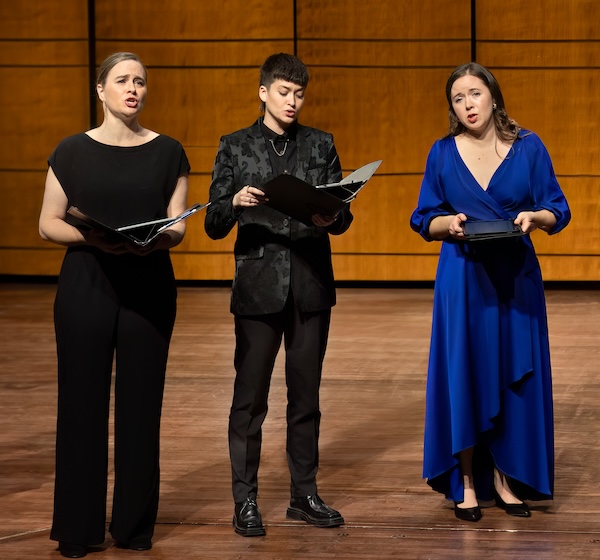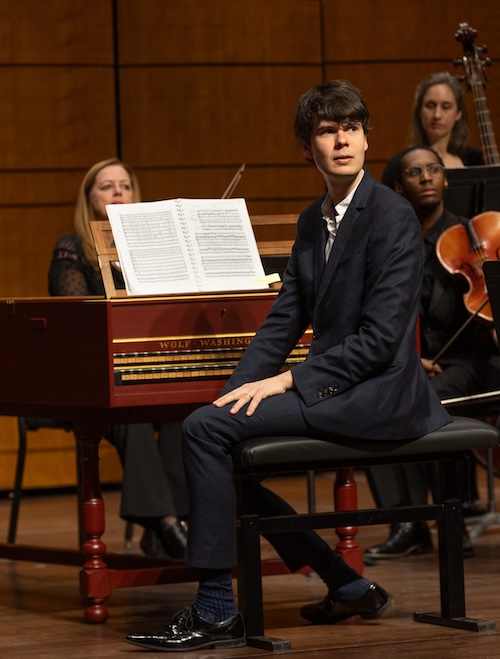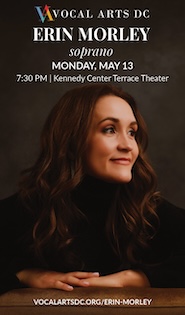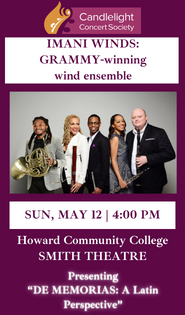Opera Lafayette’s intriguing tale of two Esthers leaves one wanting more

Singers (l to r) Kristen Dubenion-Smith, Elisse Albian, and Paulina Francisco performed with Opera Lafayette Thursday night. Photo: Jennifer Packard
Opera Lafayette brought together two rarely heard baroque works on Thursday night. Their latest concert, performed in the Kennedy Center Terrace Theater, featured a French and English work, both on the Biblical story of Esther. To keep the program to a length of ninety minutes, the evening included only limited selections from each work, drawing some interesting parallels between the two but ultimately leaving completists disappointed.
The Book of Esther recounts the story of a beautiful Jewish woman who becomes Queen of Persia. Although the tale is likely fanciful, it appears to be set during the first Persian Empire, after Cyrus the Great freed the Hebrew people from captivity in Babylon. Esther uses her influence over her husband to stop a plot to murder all Jews in the Empire, a narrative that will be remembered during the Jewish festival of Purim next month.
Jean Racine wrote his play Esther in 1689, when it was performed by the students of the Maison Royale de Saint-Louis in Saint-Cyr. Madame de Maintenon, Louis XIV’s mistress and later secret wife, founded this educational institute for young girls of noble birth. In the presence of the king, girls from the school performed the play, which was accompanied by incidental music composed by Jean-Baptiste Moreau and performed by musicians from the court.
From the harpsichord, Justin Taylor led the performance of about a half-hour of Moreau’s music for the play, starting with the Overture. With nods of head and gyrations of body, he helped the musicians emphasize the two violin parts, or the bass line played by cello, violone, and bassoon. Three singers performed in various combinations on the vocal pieces, led by the brilliant soprano of Paulina Francisco, accompanied demurely by the second violin section in “Pleurons, gémissons.”

Justin Taylor led Opera Lafayette’s performances from the harpsichord Thursday night. Photo: Jennifer Packard
Oboist Margaret Owens and bassoonist Anna Marsh, in addition to superlative playing on their instruments, took up a pair of recorders in “Dieu d’Israel” to provide gentle accompaniment to the smaller voice of second soprano Elisse Albian. Strings alone played the subtle “Prelude,” paired with the more lively “Entr’Acte.” Mezzo-soprano Kristen Dubenion-Smith struggled slightly with the extremely low range of some of her music.
Moreau’s incidental music is only tangentially related to the story of Esther in Racine’s play, limiting the interest of comparing it with the second work on the program, Handel’s Esther. Opera Lafayette performed about half of the music from the composer’s original 1718 masque version of the work, leaving aside the longer expansion into an oratorio that Handel created in 1732.
Most of the cuts to the score came down to instrumentation, because Handel augmented the scoring of some pieces with an extra bassoon or a pair of horns. An exception came in “Praise the Lord with cheerful noise,” sung with playful ornamentation added on the Da capo repeat by Francisco. Taylor played the unusual virtuoso part for obbligato harp in this aria on the harpsichord, reeling off the multiple threads of figuration with ease. Taylor also improvised a brief toccata to smooth the harmonic transition created by skipping multiple pieces.
Francisco excelled also in Esther’s slow, gorgeous aria “Tears, assist me,” matched by Owens’ expressive oboe. Tenor Jesse Darden joined Francisco beautifully in the highlight of the work, the yearning duet “Who calls my parting soul from death?” Taylor’s insistence on clipped staccato attacks in the instrumental accompaniment undercut this piece’s poignant qualities, unsettling the overlapping plaints of the two voices just slightly.
To bass-baritone Jonathan Woody fell the unenviable task of giving voice to the work’s villain, the genocidal first minister Haman. With the horrifying October 7 attacks in Israel still raw in memory, lines like “Let Jewish blood dye ev’ry hand, / Nor age nor sex I spare” sounded even more painful. With Israeli hostages still imprisoned by terrorists in Gaza, the chorus “Ye sons of Israel, mourn, / Ye never to your country shall return” also struck hard.
Woody, who was also credited with co-directing the concert, sang his arias with rhythmic verve but a wooly tone that sometimes obscured the pitch, especially in the higher reaches. It may have been preferable to cut Haman’s final aria, “How art thou fall’n from they height,” and keep instead Esther’s high-flying final aria, “Flatt’ring tongue, no more I hear thee,” in which she flatly denies Haman’s plea for mercy. (Soprano Margot Rood, scheduled to sing the role of Esther, withdrew over the weekend after contracting Covid. Francisco agreed to learn her arias and saved the day.)
The solo singers, plus Jacob Perry on the second tenor part, performed together in the choral selections, composed by Handel in five parts. The vocal ensemble’s balance and clean intonation made these often moving pieces supremely effective, accompanied by the full orchestra, now with viola players added to the texture. Trumpeter John Thiessen, having waited patiently for the entire performance, added stately glints to the delightful closing grand chorus, “The Lord our enemy has slain.” Its festive repetitions on the line “For ever blessed be thy holy name” sounded a bit like a first sketch for the far more famous “Hallelujah” chorus in Messiah.
Christophe Rousset returns to conduct the modern premiere of Mouret’s opéra-ballet Les Fêtes de Thalie 7:30 p.m. May 3 and 4. operalafayette.org



